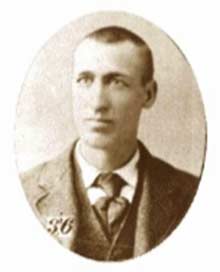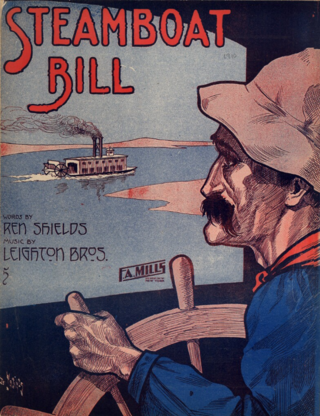
John Luther "Casey" Jones was an American railroader who was killed when his passenger train collided with a stalled freight train in Vaughan, Mississippi.

The Wreck of the Old 97 was an American rail disaster involving the Southern Railway mail train, officially known as the Fast Mail, while en route from Monroe, Virginia, to Spencer, North Carolina, on September 27, 1903. Travelling at an excessive speed in an attempt to maintain schedule, the train derailed at the Stillhouse Trestle near Danville, Virginia, where it careened off the side of the bridge, killing 11 on-board personnel and injuring seven others. The wreck inspired a famous railroad ballad, which was the focus of a copyright lawsuit and became seminal in the genre of country music.

"Oleanna" is a Norwegian folk song that was translated into English and popularized by former Weavers member Pete Seeger. The song is a critique of Ole Bull's vision of a perfect society in America. Oleanna was actually the name of one of Ole Bull's settlements in the New Norway colony of Pennsylvania. His society failed, and all of the immigrants moved away, since the dense forest made it hard to settle there. The lyrics concern the singer's desire to leave Norway and escape to Oleanna, a land where "wheat and corn just plant themselves, then grow a good four feet a day while on your bed you rest yourself."

"Steamboat Bill" is a 1910 song with music by the vaudeville group The Leighton Brothers and lyrics by Ren Shields. It became one of the first hit recordings in the United States through its 1911 recording by Arthur Collins, mostly known for the music in Disney's Steamboat Willie, the first released Mickey Mouse sound cartoon. Steamboat Bill also appeared in the 1928 Buster Keaton film Steamboat Bill, Jr.
"Midnight Special" is a traditional folk song thought to have originated among prisoners in the American South. The song refers to the passenger train Midnight Special and its "ever-loving light."

Dust Bowl Ballads is an album by American folk singer Woody Guthrie. It was released by Victor Records, in 1940. All the songs on the album deal with the Dust Bowl and its effects on the country and its people. It is considered to be one of the first concept albums. It was Guthrie's first commercial recording and the most successful album of his career.
"Engine One-Forty-Three" is a folk ballad in the tradition of Anglo-American train wreck songs. It is based on the true story of the wreck of the Chesapeake and Ohio Railway's Fast Flying Virginian (FFV) near Hinton, West Virginia in 1890.

"The Moonshiner" is a folk song with unknown origins. In Ireland and America, it is sung with similar lyrics but different melodies. It is catalogued as Roud Folk Song Index No. 4301. The song's structure is very similar to The Wild Rover, but instead extolling the virtues of moonshining.
"Rock Island Line" is an American folk song. Ostensibly about the Chicago, Rock Island and Pacific Railroad, it appeared as a folk song as early as 1929. The first recorded performance of "Rock Island Line" was by inmates of the Arkansas Cummins State Farm prison in 1934.

The Brave Engineer is a 1950 Walt Disney-produced animated short film, based on the exploits of legendary railroad engineer John Luther "Casey" Jones. It is narrated by comic Jerry Colonna and is a comedically madcap fanciful re-telling of the story related in the Wallace Saunders ballad, later made famous by Eddie Newton and T. Lawrence Seibert. It was also released fifty years after Jones was killed.

Casey Jones is an American Western television series syndicated during the 1957–58 television season. It was based upon the life of late 19th-century engineer Casey Jones in the era of pioneering western railroads. Casey Jones also aired on both the BBC and ITV in the United Kingdom and on the Seven Network in Australia.
"Casey Jones" is a song by the American rock band the Grateful Dead.
"On the Trail of the Buffalo", also known as "The Buffalo Skinners" or "The Hills of Mexico", is a traditional American folk song in the western music genre. It tells the story of an 1873 buffalo hunt on the southern plains. According to Fannie Eckstorm, 1873 is correct, as the year that professional buffalo hunters from Dodge City first entered the northern part of the Texas panhandle. It is thought to be based on the song Canaday-I-O.
"I'm Alabama Bound" is a ragtime melody composed by Robert Hoffman in 1909. Hoffman dedicated it to an M. T. Scarlata. The cover of its first edition, published by Robert Ebberman, New Orleans, 1909, advertises the music as "Also Known As The Alabama Blues" which has led some to suspect it of being one of the first blues songs. However, as written, it is an up-tempo rag with no associated lyrics. The song has been recorded numerous times in different styles—both written and in sound recordings—with a number of different sets of lyrics.
"The House of the Rising Sun" is an American traditional folk song, sometimes called "Rising Sun Blues". It tells of a person's life gone wrong in the city of New Orleans. Many versions also urge a sibling or parents and children to avoid the same fate. The most successful commercial version, recorded in 1964 by the British rock band The Animals, was a number one hit on the UK Singles Chart and in the US and Canada. As a traditional folk song recorded by an electric rock band, it has been described as the "first folk rock hit".
"Cumberland Gap" is an Appalachian folk song that likely dates to the latter half of the 19th century and was first recorded in 1924. The song is typically played on banjo or fiddle, and well-known versions of the song include instrumental versions as well as versions with lyrics. A version of the song appeared in the 1934 book, American Ballads and Folk Songs, by folk song collector John Lomax. Woody Guthrie recorded a version of the song at his Folkways sessions in the mid-1940s, and the song saw a resurgence in popularity with the rise of bluegrass and the American folk music revival in the 1950s. In 1957, the British musician Lonnie Donegan had a No. 1 UK hit with a skiffle version of "Cumberland Gap".
"Casey Jones—the Union Scab" is a song, written by labor figure Joe Hill in San Pedro, California, shortly after the first day of a nationwide walkout of 40,000 railway employees in the Illinois Central shopmen's strike of 1911. It is a parody of the song "The Ballad of Casey Jones" and is sung to its tune.
"This Train", also known as "This Train Is Bound for Glory", is a traditional African-American gospel song first recorded in 1922. Although its origins are unknown, the song was relatively popular during the 1920s as a religious tune, and it became a gospel hit in the late 1930s for singer-guitarist Sister Rosetta Tharpe. After switching from acoustic to electric guitar, Tharpe released a more secular version of the song in the early 1950s.

The Leighton Brothers was a vaudeville performance team consisting of brothers Frank Leighton and Bert Leighton. They also composed various songs, most notably "Steamboat Bill," the tune used in the Disney animated short, Steamboat Willie.








